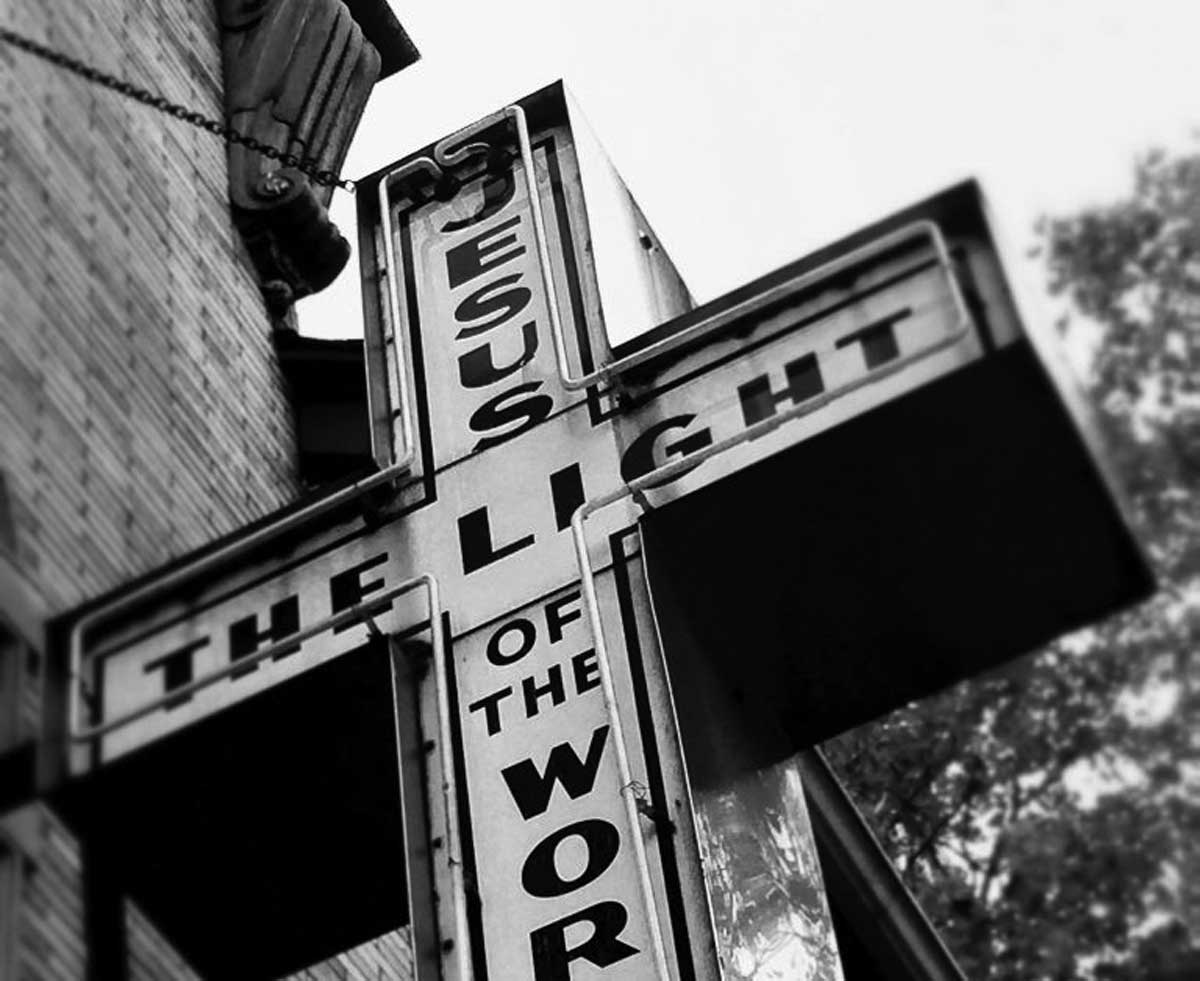Ecumenical Councils of War
The Virtue of War: Reclaiming the Classic Christian Traditions East and
West
by Alexander F. C. Webster & Darrell Cole
Regina Orthodox Press, 2004
(252 pages; $19.95, paperback)
by David B. Hart
An Antiochene Orthodox priest of my acquaintance recently told me, with every appearance of sincerity, that he had converted to the Eastern Church because he was a pacifist. For a moment, I was uncertain as to whether he was attempting to baffle me with some cunningly constructed paradox.
I would have found it a no more impenetrable non sequitur had he announced that he had joined the local Elks’ lodge because of his passion for beautiful young women, or that he enjoyed reading Calvin for the witticisms. But it soon became clear that he had meant his remark not only in earnest, but without any sense at all of its absurdity; indeed, he was somewhat disconcerted to discover that, in my own conversion to Orthodoxy almost two decades earlier, I had not been inspired in the slightest by similar motives.
It strikes me as a singular sort of delusion to imagine that the Eastern Orthodox tradition is any more hospitable to pacifism than the Western Catholic tradition, given the utter absence of pacifist tenets from Orthodoxy’s teachings, liturgy, or history. And yet, apparently, it is a delusion shared by a not inconsiderable number of (Western) Eastern Christians at present. Of course, it is something of a cottage industry in the Orthodox Church—especially among converts—to discover and “market” ever newer ancient differences between Eastern and Western Christian theology, morality, devotion, spirituality, politics, cuisine, or whatever else one can think of.
And, since an explicit and elaborate theory of “just war” is the special achievement of Western tradition, it has become received wisdom in some quarters of the Eastern Church that Orthodox tradition obviously regards all war as intrinsically “unjust” (which, for reasons obscure to me, is taken as proof of a certain spiritual superiority on the Eastern side). Thus has been born another fatuous myth regarding the division between the ancient Catholic Churches, one that—like all its predecessors—combines a refusal to learn the meaning of unfamiliar terms with a magnificent indifference to historical fact.
East & West Agree
This is not, I hasten to say, to dismiss Christian pacifism out of hand. There may be no good theological reason to prefer an unjust peace to a just war, or to pretend that the undoubted possibility of the former does not—by dialectical necessity—imply the possibility of the latter; but few of us should be confident in our ability adequately to recognize either, and—given the enormities of war—it is always wise to err here on the side of caution.
Whether, though, one views pacifists as sinewy heroes of the spirit living out a prophetic life of obedience to the true gospel message, or as pusillanimous moral dilettantes too craven to undertake the discipline of prudential reasoning in the realm of concrete morality, or merely as admirable but excitable enthusiasts, it simply is not the case that the Eastern and Western Churches differ significantly in their traditional understandings of war or warfare. And it is as well to acknowledge as much, both for the sake of Christian unity and for the sake of rational theological argument in times of international turmoil.
This, at any rate, is one of the principal arguments of Alexander Webster’s and Darrell Cole’s The Virtue of War, a thorough (if not entirely consistent) defense of just war thinking as part of the common inheritance of both the Eastern and the Western Churches. Far more, however, than an exercise in ecumenism, this is a book written with a certain palpable urgency about it: It is intended, quite unambiguously, as an exhortation to Christians to devote themselves wholeheartedly to the current “war on terror,” most especially America’s invasions of Afghanistan and Iraq. And while, in this latter cause, the book is probably a failure, this is not on account of any deficiency in the case it makes for “just” or (in Webster’s preferred phrase) “justifiable” war.
The greatest virtue of this book is that it does not advance its case only over against Christian pacifism of the sort one associates with, say, John Howard Yoder, but also over against the “Christian realism” of Reinhold Niebuhr and his disciples. It has long been one of the more irksome oddities of American Christian ethics that—in matters pertaining to war—the pacifist and realist positions have been treated as the only available options for Christian moralists.
And yet pacifism and realism are mere inversions of one another, inasmuch as they share more or less the same view of what warfare is. Both accept the premise that war is by its nature evil, while only peace is an unqualified good. The pacifist may believe that peace (understood simply as the absence of strife) is best achieved by refusing to participate in war, and the realist that peace (understood as a secure and just social order) is best achieved by answering violence with violence, but both then accept that the Christian never has any choice in times of war but to collaborate with evil: He must either allow the violence of an aggressor to prevail or employ inherently wicked methods to assure that it does not.
Webster and Cole will have none of this. The bracingly unsentimental argument that they want to make is that war in fact is not intrinsically evil, however tragic it may be, but is a neutral instrument that may be used towards ends either moral or immoral; and, when it is waged on behalf of justice and by just means, it is a positive good, a work of virtue, and an act of charity. Simply said, for Christians, to go to war should never be a tragic choice of the lesser of two evils, for we are forbidden as Christians to do evil at all.
Rather, if we go to war, it is out of a militant commitment to the peace of God’s Kingdom, and when we fight, we fight as agents of divine justice in the earth. And that may frequently be cause for sorrow, but should never be cause for contrition.
Concurring Authors
The Virtue of War is not really a single book; the two authors have not so much collaborated as concurred, each writing one half of the text and each dealing exclusively with his own tradition.
Of the two, it is Webster who has the easier task; for while Orthodoxy has never developed an explicit theory of war, the evidence against the pacifist or semi-pacifist account of Eastern tradition is nevertheless so plenteous that Webster’s half of the book has for the most part the character of a simple recitation. He gathers his proofs from Scripture, the Fathers, canon law, hagiography, devotional literature, liturgy, and modern Orthodox theologians and writers; and, by the end, only the most obdurately irenic reader would deny that he has proved his case.
In the course of his argument, his epitomes and pericopes do actually concresce into a sort of Eastern theory of justifiable war, but one that consists in nothing more than three general principles: War must be waged only on behalf of a state possessed of a proper political ethos (a state, that is, whose laws are Christian, or at least in accord with natural law); it must be waged in defense of the people of God; and it must be waged with the proper spiritual intent (that is to say, the intention of justice: both as regards the conduct of hostilities and the end towards which they are oriented).
Apart from that, Webster’s case is almost entirely historical. He is especially good at demonstrating that the Eastern fathers recognize the legitimacy and merit of the military life (as do the prayers and liturgies of the Church), that the defense of piety and order (even by force of arms) has always been regarded in the Orthodox world as a virtuous undertaking, that priests alone are forbidden to participate directly in war (because of the special purity attaching to the eucharistic ministry), and that the penitential withholding of the sacraments from warriors lately returned from battle has traditionally been observed not—for the most part—on account of anything essentially evil in the practice of war, but on account of sins that might have been committed incidentally or inadvertently in the course of a military campaign.
Where Cole assumes authorial duties, however, the book’s argument becomes at once more substantial (at least, in theoretical terms) and more problematic. He somewhat weakens his case at the outset by advocating what he calls a “Christendom-informed political theology,” by which he means one that witnesses to God’s transcendent goodness, but that does not “call for the aboli[tion] of the liberal state” or for a “theocratic” “collapse of church and state.”
“The liberal tradition is not to be overturned (even if such a thing were possible), but the church must see that the state recognizes the victory of Christ in the Advent.” This—to put it bluntly—is nonsense. Quite aside from the impossibility of Christians in any significant way impeding that process whereby the liberal order has detached itself—and continues to detach itself ever more savagely—from the moral and metaphysical absolutes of Christianity, the notion that the church can ever wring more concessions from the liberal state than it must make to the state in return is worse than naive.
An Odd Position
More importantly, by beginning his account of just war theory by bothering to recognize the legitimacy of a state not explicitly bound to divine law—however much he may urge that Christians must attempt to make the state conscious of that law—Cole puts himself in the odd position of having to argue that Christians must both obey the principles of just war and also resign themselves to fighting at the behest of a political order that has not necessarily placed itself under the sway of those principles. It is, after all, the liberal state that gave us total war in the modern age and that has often, precisely on account of its liberal utopian abhorrence of all war (as Cole himself quite acutely observes), forsaken even the pretense of justice in making war.
It is a curious thing indeed, then, for Cole to begin his defense of the just war tradition by arguing on behalf of a political system that is in its essence intractably post-Christian. If the most for which Christians can hope is that they have a “voice” in the political determinations of a government that does not otherwise acknowledge the spiritual and moral supremacy of the Church in worldly affairs, what remains of just war theory but a collection of axioms by which individual Christians must try to ascertain for themselves whether they may or may not consent to a particular war being waged by their government?
But surely just war theory is not supposed to function as a private calculus, but as a social and political rationality. In the age of the liberal state, what authority may Christians trust in times of war, if the state cannot—by its own constitutional logic—speak under the clear guidance of the Church? To be fair, Cole does attempt to answer just these questions; his answers are simply unconvincing.
Where Cole excels, however, is in providing a concise but comprehensive account of what just war principles are and how they might be brought to bear—if a given government is willing—upon modern conflicts. I know of no better summary in English of the rationality of Western just war principles, as regards both the cause (ius ad bellum) and the conduct (ius in bello) of hostilities.
Concerning the former, Cole enumerates five criteria: War may be entered upon only if it is initiated and governed by proper political authority, only if it is waged in a just cause, only if it is prosecuted with the right intention, only if no other reasonable means for resolving a crisis remains, and only if there is some real hope for success. Concerning the latter, the criteria are only two: War must never be waged with the intent of harming noncombatants, and it must follow strategies whose intended good manifestly outweighs any unintended evils that may follow from them.
And Cole’s argument acquires a considerable degree of theological depth when he turns to Augustine and Thomas for support. Here he finds a cogent account—though one, no doubt, somewhat scandalous to modern ears—of justifiable violence as a work of charity. For Augustine, certainly, love occasionally demands violence, such that the failure to use violence is also a failure of love (which is a sin). For Thomas, it is precisely because all human loves must be ordered within the love of God—who is infinite goodness—and governed by the virtue of charity that war may become inevitable for a Christian people: For an unjust peace is not pleasing to God, and the love of any earthly order must conform itself first to the love of divine justice.
Cole also shows himself to be quite critically adroit in demonstrating how far superior such a position is intellectually and morally to the pacifism of Yoder (with its myriad inconsistencies and incoherencies) and to the sub-Christian ethical consequentialism of Niebuhr (who, lest we forget, was all too willing to defend the Allies’ saturation bombing of German and Japanese civilians, which no proponent of just war theory could possibly have done).
A Flawed Book
The Virtue of War is a flawed book, I think it fair to say, for reasons both accidental and essential. At the most trivial level of grievance, I have to confess to a certain degree of annoyance at a book so carelessly edited. It is rather exasperating to see “T. S. Elliot” [sic] described as an “Englishman,” or to encounter the catachrestic substitution of “voluntarism” for “volunteerism,” or to find prima facie rendered as prima facia, or to endure as absurd and even slightly blasphemous a solecism as the transformation of libido dominandi into libido domini. (Surely, at the very least, one should expect scholars of Christian history to guard their Latin.)
At a somewhat more substantial level, it is strange to see Cole attempting to reconcile the developed Thomistic language of charity as a virtue with the older, somewhat more implausible belief advanced by Ambrose and Augustine (and accepted by Cole) that Christians are forbidden to defend themselves in all circumstances from unjust violence visited upon their own persons lest, in so doing, they offend against charity. Quite apart from the exegetical difficulties such a view presents to the theologian (For what purpose were the disciples to use the swords for which Christ prophesied they would sell their cloaks? Was he commissioning them as knights errant?), it is clearly incompatible with the rule that all earthly loves must be made subordinate to the love of God.
It is one thing to turn the other cheek against insult and casual abuse, or even to accept martyrdom, but another thing altogether to permit oneself simply to be murdered to no good end. To love charitably—selflessly—requires that love of self be ordered towards the love of God; to do this, one must learn to love oneself under the rule of justice, and to fail to do so is no less a sin than refusing to defend one’s neighbor. Indeed, defending oneself against unjust violence is one of the few times that one can most assuredly subsume self-love under the law of charity, without egoism or spite intruding at all.
But the greatest problem with this book is that it never succeeds in providing truly compelling arguments regarding how just war principles can be applied by Christians in the age of the secular state. Christians ought not to support or participate in any unjust war, says Cole; but then, also, Christians must not make war except under the authority of a state’s duly constituted military. But, surely, if there is no established Church, there is no way of knowing whether any given government will make even a show of limiting its belligerences to causes or practices condoned by Christian moral law.
How can we embrace the military profession then? And are we not inevitably reduced (as I have said) to the private prudential calculations of individual believers? When Cole attempts to lend greater moral authority to modern “just wars” by invoking such institutions as international courts while also insisting that Christians must hearken to the verdict of the Church, one wonders why he does not see the incongruity here. And, in any event, if most Christians had listened to the Church in the months leading up to the war in Iraq, would Cole have been pleased with the result?
Inescapable Difficulty
I do not much blame Webster and Cole for failing to bring their excellent historical and theoretical survey of just war thinking into credible contact with contemporary reality. It seems to me to be a difficulty that is inescapable whenever one attempts to use a moral grammar suited to an age of Christian princes and Christian cultures as a guide to our relations with the post-Christian political order. Webster is almost strident in his assertion that we can credit ourselves with virtuous warmaking in both Afghanistan and Iraq, and pray God he is right. But I cannot imagine anyone not disposed to approve of the invasion of Iraq (in particular) being convinced by any argument this book advances.
What exactly, he might ask, are we fighting for? Democracy? Freedom of religion? But these are not demonstrably biblical values. Did Iraq constitute a threat to us? Perhaps, but not a threat that can ever definitively be shown to have been more than suppositious. And even if this were not so, is this a war waged to defend the people of God? Is ours really a Christian culture—our culture of abortion, pornography, and polymorphous perversity—worthy of defending?
I am not urging any particular view of the matter, as it happens; I am only calling attention to how complicated the issue becomes when the Christian just war theorist can no longer claim that we are fighting to defend or restore a Christian order. It may well be that the only Christian argument for the war in Iraq that will not inevitably become at best equivocal when subjected to a sufficiently unyielding moral skepticism is that the suffering of the Iraqis under Saddam’s regime was sufficiently monstrous that no Christian conscience could possibly be content to leave that regime in place.
But if this is so, we may have to draw a firm demarcation between the aims of Christians in this conflict and the aims of the secular state. Perhaps we should cease to imagine that we can simply translate the principles of just war from the age of Christendom to the age of “the rights of man.” If we make war justly as Christians, we do so “alongside” the state perhaps, but surely not under its moral or (God forbid) spiritual authority.
Our alliance with the state is more or less accidental, and even somewhat opportunistic, and the prudential decisions we make for or against war must be something separate and distinct from the decisions made by our governments.
If we go forth to fight for God’s justice, we do so as citizens of a Kingdom not of this world, one that can make use of the post-Christian state, but that cannot share its purposes. To the world, this may appear to mean that we go forth only as individuals, driven each merely by the passion of his faith. Perhaps so. And perhaps it is then also the case that, really, we must learn again how to speak not only of just war, but of chivalry.
David B. Hart is the author of The Beauty of the Infinite: The Aesthetics of Christian Truth (Eerdmans, 2003), reviewed in the September 2004 issue.
subscription options
Order
Print/Online Subscription

Get six issues (one year) of Touchstone PLUS full online access including pdf downloads for only $39.95. That's only $3.34 per month!
Order
Online Only
Subscription

Get a one-year full-access subscription to the Touchstone online archives for only $19.95. That's only $1.66 per month!
bulk subscriptions
Order Touchstone subscriptions in bulk and save $10 per sub! Each subscription includes 6 issues of Touchstone plus full online access to touchstonemag.com—including archives, videos, and pdf downloads of recent issues for only $29.95 each! Great for churches or study groups.
Transactions will be processed on a secure server.
more on ecumenism from the online archives
more from the online archives
calling all readers
Please Donate
"There are magazines worth reading but few worth saving . . . Touchstone is just such a magazine."
—Alice von Hildebrand
"Here we do not concede one square millimeter of territory to falsehood, folly, contemporary sentimentality, or fashion. We speak the truth, and let God be our judge. . . . Touchstone is the one committedly Christian conservative journal."
—Anthony Esolen, Touchstone senior editor












